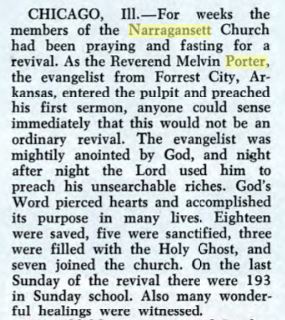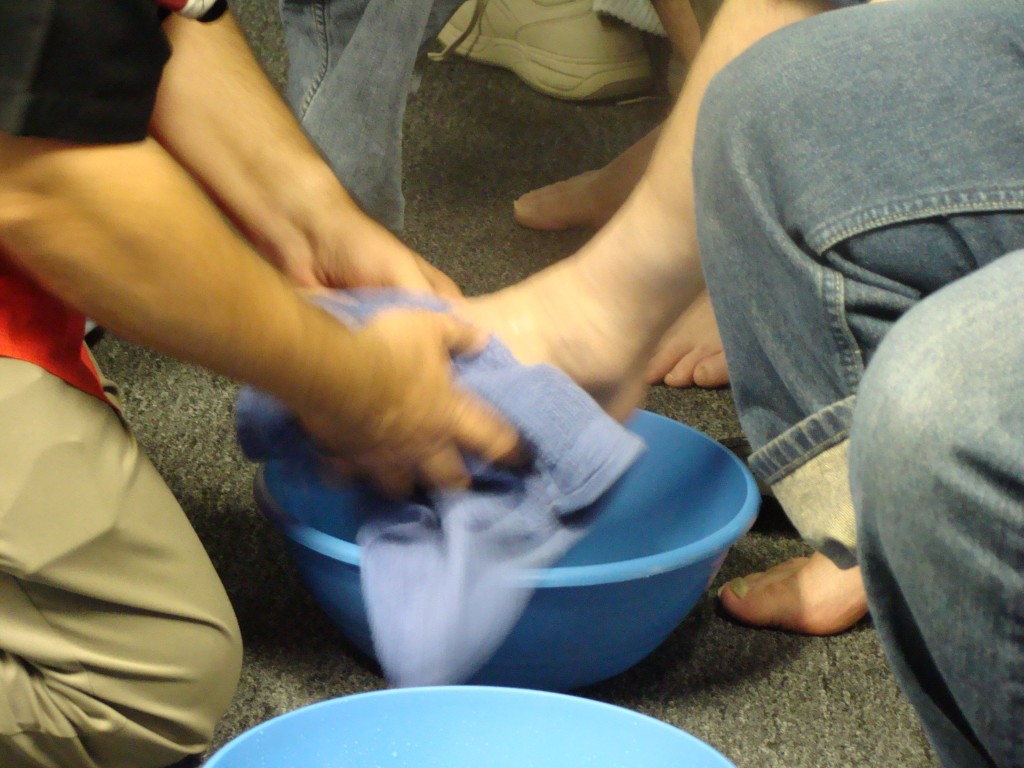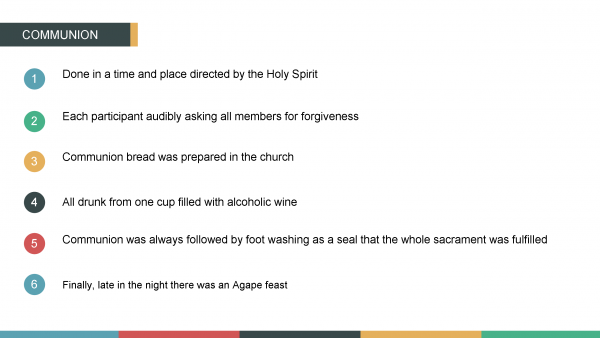Bulgarian government resigns amid protests
2254 Narragansett: The Place where First Bulgarian Church of God in America Began in 1995

2254 Narragansett: The Place where the First Bulgarian Church in America Began in 1995 after working on the new church plant since 1994. With a sequence of startup events including a July 4th block party and Bulgarian picnic, first official services in Bulgarian language was held on July 10, 1995. With over a dozen Bulgarians present at 1 PM that memorable Sunday, Rev. Dony K. Donev delivered a the first message for the newly established congregation from Genesis ch. 18.
Narraganset holds a significant place in Church of God (Cleveland, TN) history. Narraganset Church of God was started by a women-preacher with only 10 members. Rev. Amelia Shumaker started the church only 15 days before the Great Depression began in 1929. https://cupandcross.com/90-years-ago
Rev. James Slay of the Narragansett Church of God in Chicago was commissioned to write the 1948 Church of God Declaration of Faith – the most fundamental document in the history of the century-old denomination. https://cupandcross.com/chicagos-narragansett
 A multitude of documents from Church of God and other publishers testify of the rich heritage of the Narragansett Church as following:
A multitude of documents from Church of God and other publishers testify of the rich heritage of the Narragansett Church as following:
- Lighted Pathway (Nov 1953, p.23) – Pentecostal periodical content likely discussing church life or ministry in Narragansett.
- Christ’s Ambassadors Herald (July 1955, p.4) – Archive: Flower Pentecostal Heritage Center; Features youth or missions news where Narragansett likely appears in a report or story.
- Church of God Evangel (Aug 27, 1955, p.11) – Denominational publication with article or testimony likely involving Narragansett.
- Church of God General Assembly Minutes (1956, p.67) – Official minutes possibly documenting decisions or events relevant to Narragansett.
- Church of God Evangel (May 28, 1956, p.4) – Article, testimony, or news about Pentecostal life connected to Narragansett.
- Church of God Evangel (Oct 7, 1957, p.15) – News item, story, or report referencing Narragansett.
- Church of God Evangel (Oct 28, 1957, p.14) – Narragansett likely cited in context of a church event or individual achievement.
- Church of God General Assembly Minutes (1958, p.72) – Official record referencing Narragansett activities or personnel.
- Church of God Evangel (Apr 21, 1958, p.15) – Article or news referencing Narragansett Pentecostal community.
- Lighted Pathway (Aug 1958, p.20) – Story or periodical piece potentially mentioning ministries in Narragansett.
- Lighted Pathway (July 1959, p.27) – Pentecostal news possibly about events in Narragansett.
- Church of God General Assembly Minutes (1960, p.82) – Minutes likely documenting decisions involving Narragansett churches or delegates.
- Church of God (Colored Work) Minutes (1960, p.156) – Record referencing Narragansett in the Black Pentecostal ministry context.
- Lighted Pathway (Mar 1961, p.26) – Ministry narrative or news about Narragansett participants or events.
- Lighted Pathway (June 1961, p.26) – Pentecostal update likely including Narragansett.
- Lighted Pathway (June 1962, p.27) – Mission or church report involving Narragansett.
- Church of God Evangel (June 4, 1962, p.8) – Periodical item with church news or testimony from Narragansett.
- Lighted Pathway (July 1962, pp.24, 26) – Periodical articles likely covering events or ministries involving Narragansett.
- Lighted Pathway (Aug 1962, pp.25, 27) – Reports or features about Narragansett in church or ministry context.
- Lighted Pathway (Sept 1962, p.27) – Commentary or report on Pentecostal work in Narragansett.
- Church of God Evangel (Sept 3, 1962, p.11) – Church publication news or testimony related to Narragansett.
- Lighted Pathway (Dec 1962, p.25) – End-of-year feature or event report involving Narragansett.
- Lighted Pathway (Jan 1963, pp.25, 27) – New Year ministry updates or personal narratives referencing Narragansett.
- Lighted Pathway (Feb 1963, p.27) – Article tied to events or news about Narragansett.
- Lighted Pathway (Apr 1963, p.27) – Ministry or personal story mentioning Narragansett’s Pentecostal activity.
- Lighted Pathway (May 1963, pp.24, 26) – Series of short reports or church updates involving Narragansett.
- Church of God Evangel (May 27, 1963, p.13) – Denominational article highlighting Narragansett members or events.
- Lighted Pathway (June 1963, pp.25, 26) – Monthly news or highlights referencing Narragansett.
- Church of God Evangel (June 3, 1963, p.2) – Ministry or event news from Narragansett.
- Lighted Pathway (July 1963, p.26) – Summer reporting on church activity in Narragansett.
- Lighted Pathway (Aug 1963, p.26) – Monthly bulletin with Narragansett updates.
- Lighted Pathway (Oct 1963, p.26) – Late-year church life summary involving Narragansett.
- Lighted Pathway (Nov 1963, p.26) – Ministry or church news referencing Narragansett Pentecostal community.
- Church of God Evangel (Nov 4, 1963, p.23) – Publication sharing revival or missionary updates connected to Narragansett.
- Church of God General Assembly Minutes (1964, p.98) – Official record documenting actions or ministers in Narragansett.
- Lighted Pathway (Jan 1964, p.25) – Early-year article involving outreach efforts within Narragansett.
- Lighted Pathway (July 1964, p.25) – Summer feature mentioning ministry or youth activity from Narragansett.
- Church of God Evangel (Oct 5, 1964, p.4) – Periodical covering sermon, testimony, or outreach from Narragansett.
- Church of God in Christ Women’s Int’l Convention Souvenir Journal (1966, p.33) – Biographical or feature mention related to Narragansett.
- Lighted Pathway (Nov 1966, p.22) – Article focusing on community or youth ministry involving Narragansett.
- Lighted Pathway (Mar 1968, p.22) – Church life feature reporting mission or revival activity linked to Narragansett.
- Church of God Evangel (Oct 28, 1968, p.19) – Denominational story referencing Narragansett churches or workers.
- Church of God General Assembly Minutes (1970, p.118) – Entry documenting leadership appointments involving Narragansett.
- Church of God General Assembly Minutes (1974, p.266) – Proceedings referencing Narragansett ministry or district data.
- Church of God Evangel (Nov 11, 1974, p.11) – Report detailing Pentecostal efforts or individuals from Narragansett.
- Church of God Evangel (Feb 24, 1975, pp.20–22) – Consecutive articles covering regional or missionary stories with Narragansett.
- Church of God Evangel (Apr 14, 1975, pp.18–21) – Cluster of related news items mentioning Narragansett connections.
- Church of God General Assembly Minutes (1976, p.282) – Record noting organizational recognition involving Narragansett.
- Church of God General Assembly Minutes (1978, p.291) – Summary documentation listing Narragansett pastors or resolutions.
- Church of God Evangel (June 12, 1978, p.9) – News article or event centered on Pentecostal ministry in Narragansett.
- Church of God Evangel (Dec 24, 1979, p.8) – Story or holiday report connected to Narragansett.
- Church of God General Assembly Minutes (1980, p.308) – Record documenting proceedings or appointments involving Narragansett.
- Church of God General Assembly Minutes (1982, p.327) – Assembly notes on activities or delegates linked to Narragansett.
- Church of God General Assembly Minutes (1984, p.320) – Reference to ministry developments affecting Narragansett.
- Mission America Newsletter (Jan 1984, p.3) – Mission-focused newsletter item covering Narragansett outreach.
- Church of God General Assembly Minutes (1988, p.387) – Record of ongoing ministry and leadership from Narragansett.
- Church of God Evangel (June 1995, p.33) – Summer news or ministry highlights connected to Narragansett.
- Lee Review (2009, p.6) – Academic or reflective article mentioning Narragansett in theological context.
- Lee Review (2009, p.163) – Further academic commentary referencing Narragansett history.
- Church of God Evangel (Jan 2009, p.29) – Article or testimony on 21st-century Pentecostal activity in Narragansett.
- Church of God Evangel (Dec 2011, p.19) – Year-end church reporting or testimony tied to Narragansett ministries.
- Living the Word: 125 Years of Church of God Ministry (2012, p.19) – Book excerpt referencing significant Narragansett milestones.
- Unto the Least of These: A History of Church of God Benevolence Ministries (2022, p.17) – Benevolence ministry history featuring Narragansett outreach.
- Unto the Least of These (2022, p.18) – Continuation highlighting Narragansett’s benevolence role.
- Unto the Least of These (2022, p.20) – Most current publication focusing on Pentecostal service and impact in Narragansett.
The Practice of Corporate Holiness within the Communion Service of Bulgarian Pentecostals
by Dony K. Donev, D.Min.
Historical and Doctrinal Formation of Holiness Teachings and Praxis among Bulgarian Pentecostals (Research presentation prepared for the Society of Pentecostal Studies, Seattle, 2013 – Lakeland, 2015, thesis in partial fulfillment of the degree of D. Phil., Trinity College)
Pentecostal identity was corporately practiced and celebrated within the fellowship of believers through the partaking of Holy Communion. We have otherwise extensively described the Communion service among Bulgaria’s conservatives in Theology of the Persecuted Church (Part 1: Lord’s Supper https://cupandcross.com/theology-of-the-persecuted-church/). Therefore, here we offer just a brief overview of its main characteristics.
- It was done in a time and place directed by the Holy Spirit
- If some did not have water baptism they were taken to a close by river to be baptized while the rest of the church prayed
- Upon returning, if some did not have yet the baptism with the Holy Spirit, the church would pray until all were baptized
- It began with each participant audibly asking all members for forgiveness
- they would also audible respond with the words: WE FORGIVE YOU and may GOD also forgive you
- The communion bread was prepared on the spot baked by women whose names were also reveled in prayer
- All drank from one cup, which strangely for their strict practice of abstinence from alcohol, was filled with alcoholic wine
- Communion was served only to those who had the fullness of the Spirit, and had just requested and were given forgiveness
- The presbyter would quote Jude 20 to each partaking believer thus directing them to audibly speak in tongues before they could participate in communion
- Interpretation often followed to confirm the spiritual stand of the believer
- If there were any leftovers, the Communion elements were served again until all was used
- Communion was incomplete without foot washing as a seal that the whole sacrament was fulfilled.
30 Years of the Bulgarian Church of God in Chicago

July 10, 2015 marks the 20th anniversary of the first service of the Bulgarian Church of God in Chicago in 1995.
We have told the Story of the first Bulgarian Church of God in the Untied States (read it here) on numerous occasions and it was a substantial part of our 2005 dissertation (published in 2012, see it here).
From my personal memories, the exact beginning was after Brave Heart opened in the summer of 1995 and the Narragansett Church of God closed the street for a 4th of July block party with BBQ, Chicago PD horsemen, a moonwalk and much more.
The first service in the Bulgarian vernacular was held Sunday afternoon, July 10th 1995 being the true anniversary of the Bulgarian Church in Chicago. Only about a dozen were present and the sermon I preached was from Hebrews 13:5. Unfortunately, to this day 20 years later, we cannot locate the pictures taken that day to identify those present. And some have already passed away.
Using a ministry model that later became a paradigm for starting Bulgarian churches in North America (see it in detail) the church grew to over 65 members in just a few weeks by the end of July. This was around the time the movie Judge Dread had opened and the first edition of Windows 95 was scheduled for release in Chicago. I saw them both at the mall on upper Harlem Boulevard.
The Bulgarian Church of God in Chicago followed a rich century-long tradition, which began with the establishing of Bulgarian churches and missions in 1907. (read the history) Consecutively, our 1995 Church Starting Paradigm was successfully used in various studies and models in 2003. The program was continuously improved in the following decade, proposing an effective model for leading and managing growing Bulgarian churches.
Based on the Gateway cities in North America and their relations to the Bulgarian communities across the continent, it proposed a prognosis toward establishing Bulgarian churches (see it here) and outlined the perimeters of their processes and dynamics in the near future (read in detail).
After a personal xlibris, the said prognosis were revisited in 2009 in relation to preliminary groundbreaking church work on the West Coast and then evaluated against the state of Bulgarian Churches in America at the 2014 Annual Conference in Minneapolis.
We’re yet to observe the factors and dynamics determining if Bulgarian churches across North America will follow their early 20th century predecessors to become absorbed in the local context or alike many other ethnic groups survive to form their own subculture in North America. We will know the answer for sure in another 30 years…

Bulgarian Pentecostal riddle…
Five kings with five crowns
Four bishops and castle in the middle
Who will blow the whistle
and who will play the fiddle?
A Bulgarian Pentecostal riddle…
Bulgarian Church Protection of Jews in World War II
Parush R. Parushev
In the rescue of Bulgarian Jews from German death camps, the active role of Christian communities is often overlooked. To have a complete picture of events it is necessary to examine the redemptive role of Bulgarian Orthodox and other Christian communities in moving the nation toward acts of civil disobedience in order to rescue the country’s Jews.
The Orthodox
In Frederick B. Chary’s words: “No other institution with comparable influence so consistently opposed the government’s anti-Semitic policy as did the Holy Synod of the Bulgarian Orthodox Church.”1 The church’s leading prelates, Metropolitan Stefan of Sofia (future Exarch, 1945-48), Metropolitan Kyril of Plovdiv (future Patriarch, 1953-71), and Metropolitan Neofit of Vidin (acting president of the Holy Synod), unanimously and vocally condemned repressive measures against Bulgaria’s Jews. In turn, all other church officials followed their lead.2
Metropolitan Kyril, a member of the Bulgarian Academy of Sciences, challenged anti-Semitism in print as early as 1938. Then after the Bulgarian government enacted anti-Semitic legislation on 21 January 1941, church reaction was swift and indignant. Metropolitan Stefan, taking the Jewish cause as his personal mission, repeatedly intervened with the police and local government authorities on behalf of this persecuted minority. He also boldly preached against anti-Semitism in spite of numerous government attacks against him. Upon learning of the deportation of Jews from Thrace and Macedonia, he urged King Boris of Bulgaria to block this action, but unfortunately, unsuccessfully. In March 1943, during the days of impending Jewish deportations, Metropolitans Stefan and Kyril both offered refuge to Jewish leaders in their private homes.
On 2 April 1943 the Holy Synod reminded the government of its firm support for Bulgarian Jews, with Metropolitan Kyril stating, “Until now [I] have always been loyal toward the government. Now I reserve the right to act with a free hand in this matter [of the defense of the Jews] and heed only the dictates of my free conscience.”3 On behalf of the Synod, Metropolitan Neofit also warned King Boris: “Because of the extraordinary measures . . . [and] unscrupulous harshness against the Jews . . . God’s wrath against our people may be provoked.”4 No doubt the Church’s bold warnings were “a very influential factor in Boris’ rejection of deportation as a solution to the Jewish question in 1943.”5
According to the 1941 Law for Protection of the Nation, some Jews were to be exempted from its discriminatory provisions. While exemptions theoretically were to benefit very few, in practice they became widely available, thus sabotaging the harshest provisions of the legislation. For example, so-called “mercy baptisms,” liberally conducted, saved considerable numbers of Jews. As Peter Meyer notes, “Because the law spoke of conversion and not baptism having to take place before 1 September 1940, Jews baptized later could also be saved if ministers declared that they had expressed their will to adopt Christianity before that date. Many courts accepted this reasoning.”6
The Catholics
In the life-and-death struggle to rescue Bulgaria’s Jews, Christian confessional boundaries did not impede common cause. Metropolitan Stefan knew of the influence of the small but active Bulgarian Roman Catholic community on Italian-born Queen Giovanna. In the face of pending deportation, he advised Jewish leaders to meet with Catholic priest Fr. Jean Romanov, the queen’s spiritual father.7 Also by 1943 Monsignor Roncalli, the future Pope John XXIII and a personal friend of Metropolitan Stefan’s, had secured, with the help of King Boris, transit visas for thousands of Jews from Slovakia and Hungary who were escaping concentration camps by immigrating to Palestine.8 In addition, Metropolitan Stefan was in touch with Bulgaria’s evangelical churches in his attempts to rescue Jews.9
The Evangelicals
The small evangelical community in Bulgaria also took action in defense of the country’s Jews.10 In the early 1940s Nazi German publications frequently complained of Bulgarian complacency in the enforcement of anti-Semitic legislation and of church measures to protect Jews. One German newspaper reported that one Protestant minister “with a community of about 200 souls, managed to baptize 200 additional persons [all Jews] between January and September 1940.”11 After years of searching for direct evidence of this evangelical involvement in rescuing Bulgarian Jews, I discovered that unnamed ministers referred to in the German newspaper were Congregationalist Pastor Asen Mikhailov Simeonov and Baptist Pastor Minkov Radev.12
The First Congregational Church in Sofia under Senior Pastor Simeonov and Assistant Pastor Radev was especially active in assisting Jews. Born in an Orthodox family strongly connected to the Bulgarian Revival,13 Simeonov apparently was converted in a Methodist church while studying in Pleven. After seminary studies in Switzerland, he served Methodist churches in Sevlievo, Plovdiv, and Sofia. Simeonov married a Congregationalist, and in 1935 he was appointed pastor of the First Congregational Church in Sofia.14 From 1935 to 1941 Simeonov and his associate pastor, Baptist Minkov Radev, issued baptismal certificates to Jews. For this aid both pastors lost their church posts and their minister’s licenses in 1941 on orders of the Fascist government.15
The dismissal of Simeonov and Radev did not stop the church’s support of Bulgaria’s Jews. Simeonov’s successor, Pastor Vasil Georgiev Zjapkov, followed in his footsteps.16 As representative of the Alliance of Bulgarian Evangelical Churches,17 he was actively involved with Metropolitan Stefan in assisting Bulgaria’s Jews and in putting pressure on King Boris to prevent their deportation.18
For evangelical pastors Simeonov, Radev, and Zjapkov, as well as for the leadership of the Orthodox Church, it was clear that mercy baptisms were just that – acts of mercy. Christian ministers were well aware that conversions of the heart were not taking place in these acts of baptism. As Simeonov testified, “The majority of the Jews were experiencing deep pain that they had to compromise their faith. And most of them did not do it out of changing their convictions, but because they were forced by the circumstances. Therefore, I did not consider myself a missionary; my duty was simply to help them.”19
In Summary
The role of Bulgarian Christian communities standing in defense of their Jewish compatriots is a remarkable story. These communities gave concrete moral witness in action to faithfulness to a noble vision. In spite of their prominent participation in rescue activities, Christian communities in Bulgaria have been given little credit in secular historiography. Even though there was widespread public support from all levels for acts of rescue, the unanimous support of the efforts by all Christian communities, without exception, is the most telling part of this story. Faced with the dilemma of taking sides in the confrontation of a defiant people against a powerful and corrupt government, religious leaders firmly sided with their flocks and with the Jewish people. As a result, while many Bulgarians of the anti-Fascist resistance movement were incarcerated in concentration camps, not one Bulgarian Jew was sent to death camps.
I believe the Jewish Exodus after 400 years of slavery in Egypt informed Bulgaria’s understanding of its own liberation after 500 years of Ottoman oppression. Thus, the rescue of Bulgaria’s Jews is best understood as an act of civil disobedience motivated by attitudes unique to the Bulgarian context. Bulgaria’s support for its Jews in defiance of the Germans bears the marks of Christian social ethics internalized by the Bulgarian community through the prolonged period of national revival in the 18th and 19th centuries and recorded in the country’s Founding Constitution. F
Notes:
Frederick B. Chary, The Bulgarian Jews and the Final Solution 1940-1944 (Pittsburgh, PA: University of Pittsburgh Press, 1972), 188.
2Michael Bar-Zohar, Beyond Hitler’s Grasp: The Heroic Rescue of Bulgaria’s Jews (Holbrook, MA: Adams Media Corporation, 1998), Chapter 13.
3David Cohen, Otseljavaneto: Sbornik of Documenty 1940-1944 [The Survival: A Compilation of Documents 1940-1944] (Sofia, Bulgaria: “Shalom” Publishing Center, 1995), 230; Tzvetan Todorov, The Fragility of Goodness: Why Bulgaria’s Jews Survived the Holocaust. A Collection of Texts with Commentary (Princeton, NJ: Princeton University Press, 2001), 98.
4 Bar-Zohar, Beyond Hitler’s Grasp, 173.
5 Chary, Bulgarian Jews, 189; Stephane Groueff, Crown of Thorns: The Reign of King Boris III of Bulgaria, 1918-1943 (Lanham/New York/Oxford: Madison Books, 1998), 328.
6 Peter Meyer, “Bulgaria,” in Peter Meyer, Bernard D. Weinryb, Eugene Duschinsky, and Nicolas Sylvain, The Jews in the Soviet Satellites (Westport, CT: Greenwood Press Publishers, 1971), 571.
7 Bar-Zohar, Beyond Hitler’s Grasp, 194. The Apostolic Delegate in Sofia Monsignor Giuseppe Mazzoli helped negotiate the rescue of the Jews (Ibid., 188 and 202-03). On cooperation and good relations between Bulgarian Orthodox and Catholics in Bulgaria, see Peter Hebblethwaite, John XXIII: Pope of the Council (London: Cassell Ltd., 1984), 141, 175-77.
8 Groueff, Crown of Thorns, 230.
9 Veselin Ignatov, “Pastir Zjapkov i Evreite [Pastor Zjapkov and the Jews],” Zornitsa [Morning Star] 121 (April, 1997); Hristo Kulichev, ed., Vestitely na Istnaia: Istorja na Evangelskite Tsarkvi v Balgaria [Heralds of the Truth: A History of the Evangelical Churches in Bulgaria], 2nd ed. (Sofia: Bulgarian Bible Society, 1994), 264-65; 275-76.
10 Cohen, Otseljavaneto, 42-43.
11 Meyer, “Bulgaria,” 571 and 623; D. Andreev’s article in the newspaper Dnes [Today], 24 June 1941, as quoted by Ljubomir Vladikin, “Die Judengesetzgebung in Bulgarien,” Weltkampf, Munich, No. 2 (October-December 1942), 291, cited by Meyer in “Bulgaria,” 623.
12 I want to express my special gratitude to Dr. Hristo Kulichev for his support and help in finding contacts and materials of the Bulgarian Evangelical relationship with the Jews during World War II. He was instrumental in organizing a meeting with Lidja Asenova Simeonova, the daughter of Asen Simeonov. She provided personal documents from her father’s file from the archives of the Bulgarian Communist security prison system and gave me indispensable insights into her father’s life and ministry for the Jews (personal interview, 14 March 2002).
13 His grandfather, Simeon Benchov, was an Orthodox priest active in the 19th century Bulgarian Revival who passed on the vision of the revival to his grandson (interview with Lidja Asenova Simeonova, 14 March 2002; Kulichev, Vestitely na Istinata, 275-76). For Simeon Benchov’s biography, see the entry in Bulgarska Vazrozhdenska Intelegentsia [Encyclopedia of the Bulgarian Revivalist Intelligentsia] (Sofia: Dr. Petar Beron Publisher, 1988).
14 The service of induction was held on 15 November 1931; see “Programa za ustanovjavavaneto nap astir Asen M. Simeonov v I-va Evangelska Tsarkva, ul. Solun 16, Sofia” [Program for the Induction of Pastor Asen M. Simeonov in the First Evangelical Church on 16 Solun Street, Sofia] in the author’s possession.
15 “Reference: Concerning Asen Michailov Simeonov” (Simeonov file in the Archive of the Directory of Police, 10 March 1958, 129. Absolutely Secret) and “Agent’s Report to the Chief Officer of Division ‘B’. 1-Department in regard to the investigation of Asen Mikhailov Simeonov,” Report of agent of 23rd group of the Division ‘B’ of the First Department (Simeonov file in the Archive of the Directory of Police, January 1950, p. 45, Sofia, Strictly Confidential).
16 Kulichev, Heralds of the Truth, 273-75.
17 Ibid., 275.
18 Eyewitness report of Ignatov, “Pastir Zjapkov i Eveite,” 3.
19 Nikola Kjosev, “Pastir Asen Simeonov,” Zornitsa [Morning Star], 123 (May 1999), 2. Simeonov’s testimony is confirmed by prominent poet Valeri Petrov who writes: “I know that because I am one of the baptized….Our family [with a Jewish father and a Bulgarian mother] was a family of atheists and faith cannot be imparted with a document, and Pastor Simeonov knew that very well.” Hristo Kulichev, Contributions of the Protestants to the Bulgarian People (Sofia, Bulgaria: St. Kliment of Ohrid Publisher, Sofia University, 2008, in Bulgarian, 281).
Edited excerpts published with permission from Parush R. Parushev,“Walking in the Dawn of the Light: On the Salvation Ethics of the Ecclesial Communities in the Orthodox Tradition from a Radical Reformation Perspective,” Ph.D. dissertation, Fuller Theological Seminary, 2006.
The Unrealized Spiritual Harvest of Bulgarian Churches in North America
 ….A closer examination of the ministry and structure of the network of Bulgarian churches in North America will give answers to essential issues of cross-cultural evangelism and ministry for the Church of God. Unfortunately, until now very little has proven effective in exploring, pursuing and implementing cross-cultural paradigms within the ministry opportunities in communities formed by immigrants from post-Communist countries. As a result, these communities have remained untouched by the eldership and resources available within the Church of God denomination. There are presently no leaders trained by the Church of God for the needs of these migrant communities. Thus, a great urban harvest in large metropolises, where the Church of God has not been historically present in a strong way, remains ungathered. Although, through these communities, the Church of God has the unique opportunity to experience the post-Communist revival from Eastern Europe in a local Western setting… (p.84, Chapter III: Contextual Assessment, Historical Background, Structural Analyses and Demographics of Immigration in a Paradigm for Cross-Cultural Ministries among Migrant and Disfranchised Ethnic Groups in America Today) Read complete paper (PDF)
….A closer examination of the ministry and structure of the network of Bulgarian churches in North America will give answers to essential issues of cross-cultural evangelism and ministry for the Church of God. Unfortunately, until now very little has proven effective in exploring, pursuing and implementing cross-cultural paradigms within the ministry opportunities in communities formed by immigrants from post-Communist countries. As a result, these communities have remained untouched by the eldership and resources available within the Church of God denomination. There are presently no leaders trained by the Church of God for the needs of these migrant communities. Thus, a great urban harvest in large metropolises, where the Church of God has not been historically present in a strong way, remains ungathered. Although, through these communities, the Church of God has the unique opportunity to experience the post-Communist revival from Eastern Europe in a local Western setting… (p.84, Chapter III: Contextual Assessment, Historical Background, Structural Analyses and Demographics of Immigration in a Paradigm for Cross-Cultural Ministries among Migrant and Disfranchised Ethnic Groups in America Today) Read complete paper (PDF)
How to Start a Bulgarian Church in America from A-to-Z
Bulgarian Exit Polls Raise Fears Of Political Stalemate
SOFIA – In what appears to be the continuation of a long-standing political deadlock, exit polls gave former Prime Minister Boyko Borisov’s center-right GERB party the most votes in Bulgaria’s parliamentary elections but without enough support to form a government by itself.
The influential Alpha Research/BNT exit poll gave GERB 26.4 percent of the vote, followed by the reformist PP (We Continue The Change) at 14.9 percent and the far-right, pro-Russia Revival Party at 12.9 percent, amid low turnout. An exit poll conducted for bTV by Market Links had similar results, albeit with a slightly higher figure for GERB. Other parties appeared to score enough to reach the 4 percent minimum requirement to gain seats in parliament, with two other groupings near that level.
Borisov’s pro-Western GERB party is not expected to win enough seats for a parliamentary majority and will need to form a coalition. GERB announced that Borisov would be their candidate for prime minister if it secures at least 80 out of 240 seats in parliament. PP (We Continue The Change) has said it would not support Borisov for the position and have demanded an independent prime minister with strong anti-corruption credentials.
Bulgarian Elections Explained
October 2024 Bulgarian Parliamentary Election
October 20, 2024 by Cup&Cross
Filed under Events, Featured, News, Publication
Snap parliamentary elections were held in Bulgaria on 27 October 2024,[1][2] after all three attempts to form a government following the latest June 2024 elections failed. This was the country’s sixth snap election since 2021. This series of snap elections is the result of a political crisis affecting the country.
June elections
The June 2024 elections, held at the same time as the European Parliament elections, had the lowest turnout (33%) since the end of communist rule in 1989.[3] It resulted in GERB–SDS winning most of the votes and 68 seats, with no party or alliance obtaining enough seats to form a majority in the National Assembly.[15] The new elected 50th Parliament replaced the 49th Parliament,[16] when all elected members were sworn in on 19 June.[17] Government formation attempts were given to GERB, PP–DB and There is Such a People (ITN), with the final attempt failing on 5 August.[18][19][20]
On 9 August the Bulgarian President as a consequence instead appointed the Vice President of the Bulgarian National Audit Office, Goritsa Grancharova-Kozhareva, as the next caretaker prime minister.[21] Grancharova-Kozhareva was granted ten days to form a proposal for the next caretaker government to be appointed on 20 August, and the upcoming next parliamentary elections were scheduled for 20 October 2024.[22] Grancharova-Kozhareva made the controversial decision to propose that the incumbent minister of the interior, Kalin Stoyanov, should remain in his role, but this was opposed by president Rumen Radev. Radev rejected the government proposal, delaying the upcoming election.[23]
Following the rejection of Grancharova-Kozhareva, Radev re-appointed Dimitar Glavchev as the caretaker prime minister,[24] and his government proposal was sworn in on 27 August, and the elections were set for the 27 October.[25][26]











